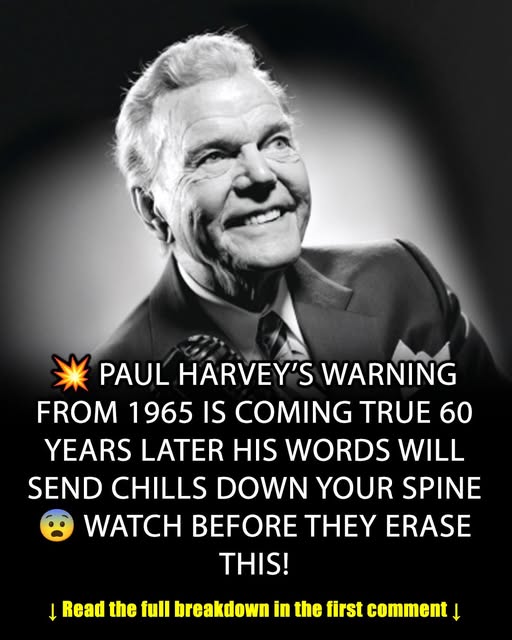When I think back to my childhood in the 1970s, some of my warmest memories center around quiet afternoons in our cozy living room, sitting next to my mother with the soft glow of the radio filling the air as we tuned in to Paul Harvey’s daily broadcasts. It was a ritual we cherished.

Every afternoon, like clockwork, we’d settle into our favorite armchair, the familiar theme music playing, and we knew we were about to be transported into a world of storytelling that blended the heart of small-town America with global events, all delivered in Paul Harvey’s unmistakable voice—equal parts wit, gravity, and homespun wisdom. My mother often said Paul Harvey had a gift that went beyond reporting the news—she believed he possessed a kind of prophetic understanding of human nature and the tides of history. She would lean forward, eyes fixed on the radio, and whisper, “Watch how he connects the dots.”
I would listen closely, amazed at how he could weave together seemingly unrelated events into one coherent, powerful narrative. Back then, it felt like he was simply a master storyteller. Now, looking back and listening to those same broadcasts decades later, it’s almost eerie how many of his observations have proven true, unfolding just as he described them more than fifty years ago. Harvey didn’t just recount events; he warned us about where the currents were heading—shifts in the economy, evolving social attitudes, the creeping influence of technology, and the power of media to shape the way we see the world. At the time, his words felt like colorful speculation.
Today, they feel like a blueprint of the present. His legendary sign-off—“And now you know… the rest of the story”—wasn’t just a clever catchphrase. It was a challenge, an invitation to think critically, to recognize the deeper patterns beneath the headlines, and to prepare ourselves for what might be around the corner. Long before the Internet became part of everyday life, he spoke of a connected world where information and communication would move instantly across borders.
He warned about the dangers of political division, how it could erode trust in our institutions. He even addressed environmental concerns at a time when they were far from mainstream conversation. Listening now is like watching a time-lapse film of history, with his voice as the steady narration guiding us through decades of transformation. I remember one particular broadcast from the late 1970s where he predicted a future in which “machines will learn from experience, and voices will travel across continents in an instant.” My mother and I exchanged amused glances, sure he was exaggerating for dramatic effect.
Yet here we are today, with artificial intelligence embedded in our daily routines and video calls connecting us instantly with loved ones thousands of miles away. In another broadcast, he spoke of grassroots movements reshaping society and warned that complacency could be more dangerous than hardship. His words ring just as true now, in an age where civic engagement and activism make headlines worldwide. Revisiting those recordings now, I feel a connection not only to my mother, who taught me the value of curiosity and questioning, but also to the sweep of history Paul Harvey chronicled with such skill.
His rich baritone voice, his deliberate pauses, and the rhythm of his delivery made his messages unforgettable. He didn’t just tell us what was happening—he made us see how it fit into the larger story of who we are and where we are going. Whether you have listened to him for decades or are hearing his voice for the first time, there’s something timeless about the clarity of his vision. As you hear his words today, you can’t help but reflect on how much of what he foresaw has already shaped our world and how much is still unfolding.
Paul Harvey once reminded us that “history is still going on,” and in revisiting his insights, we see not just a reflection of our past but a compass for our future. His broadcasts remain a testament to the power of keen observation, thoughtful storytelling, and the importance of paying attention—not only to what is happening now but to what it might mean for the days to come.





